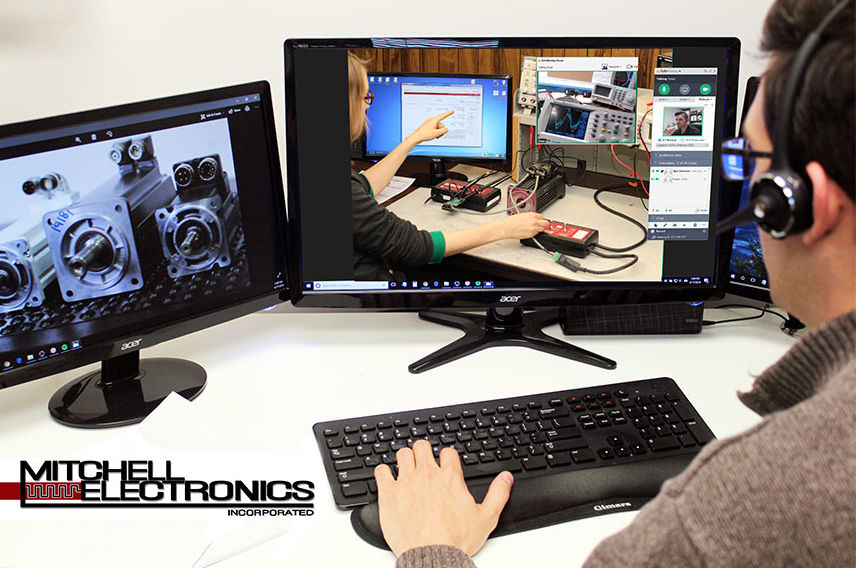Online Servo Motor Repair Training
Delivering the Highest Return on Your Servo Motor Investment
While training and support might be an afterthought for some companies, at Mitchell Electronics, Inc. we recognize the value it provides to our customers. Training is an investment in your people, equipment, and ultimately contributes toward the bottom line.
This is why we offer a variety of training programs tailored to your unique needs and applications. At Mitchell Electronics, Inc., we believe training is a continuous process. So, whether you have a new technician starting out or an experienced vet working with a brand-new encoder type, online training is always available. What’s more, we offer training in English, Spanish, Portuguese, German, or French!
Additional benefits include:
- Establish initial understanding as well as improve on ongoing basis
- Eliminate travel costs
- Adapt short sessions to your busy schedule
- Diagnose your own motor repair job in the first session with our customized approach
- Practice using your own workshop setup
- Schedule alone or with your colleagues at remote branches
- Adapt to your schedule or schedule spontaneously with short notice
In this blog we’ll discuss our approach to training, why we believe this is the best approach, and why our programs are so successful.
The Benefits of Short, Focused Training Sessions
“At one time our product training largely followed the traditional model,” said Vice President, Stuart Mitchell. “Fly your trainees to the host’s facility, have them try to absorb as much information as possible in two or three days, and return home to begin implementing what they learned – or at least as much of it as they can remember. It was like trying to drink from a firehose.”
To help make training more effective and economical, Mitchell altered its approach to training. And the changes have been well received by the company’s customers.
“We found it beneficial to space training out over a longer period rather than an intense cramming session. Our programs are provided online and structured to be spaced out with short sessions spanning several weeks. This allows those being trained to digest and apply what they are learning. For example, training customers with a motor on their site using the TI-5000JX and a cable from Mitchell Electronics, Inc. provides immediate diagnostic results in the first session. This not only saves our customers time and travel costs, but studies show this to be a more effective way to learn.”
Studies Back This Up
The concept of spacing sessions over time has been studied and tested throughout both academia and corporate environments. Incremental training has proven to be more beneficial than intensive bulk training for several reasons, particularly when it comes to retention and the ability to apply new knowledge effectively.
Incremental training promotes better retention of information. The Ebbinghaus forgetting curve, developed by the German psychologist Hermann Ebbinghaus, shows that people forget newly learned information rapidly, with a significant portion being lost within the first few days. However, when learning is spaced out, with periodic review and reinforcement of key concepts, retention improves dramatically. This is due to the brain having time to process and consolidate the information between sessions.
Studies in corporate training environments have shown similar results. This blog on Whatfix.com argues that effective long-term learning is compromised by long sessions that overwhelm learners with too much information at once, making it difficult to retain key information. Training spaced out over time helps employees not only remember the information but also to use it more effectively in their work environments.
Training Models Designed for Everyday Application
Weekly training allows for immediate application of the material learned in the workplace. The ability to apply new knowledge and skills soon after learning them is critical for embedding those skills into long-term memory. When training is spread out, participants can apply what they learned between sessions. Moreover, they can then return to the next session with insights or specific or quantified questions.
This learn-apply-learn cycle creates a more dynamic and impactful training experience. In his article, A New Paradigm For Corporate Training: Learning In The Flow of Work, Josh Bersin discusses the evolution of training to include “MicroLearning”. That is the opportunity to absorb and apply training in incremental doses.
Less is More
Intensive bulk often leads to mental fatigue, making it difficult to absorb and retain information, as the brain struggles to process too much information at once. Conversely, incremental training reduces this mental overload by presenting smaller doses of information that are easier to digest. Participants can focus on mastering a few key concepts at a time rather than being overwhelmed by a massive influx of information.
At Mitchell Electronics, Inc. we believe that training is only valuable if it delivers lasting results. And studies consistently show that spaced learning leads to better outcomes, as it allows learners to process, retain, and apply new information more effectively. This is why we tailor training to your unique applications, requirements, and schedule. Plus, our customers can schedule spontaneously with short notice as included in their software license fees.
Schedule Servo Motor Training Today
Maximize the value of your investments in staff and equipment. Go here to learn more or to schedule your training.
You can also download The Quick Reference Guide to Servo Motor Maintenance and Repair. Inside this in-depth guide, you’ll find insights into:
- Diagnosing common servo issues
- Understanding common servo error codes
- Knowing what you can fix in-house and what needs to be sent out for repair
- Identifying tools you’ll need to make repairs in-house
- Learning what makes a successful repair shop


